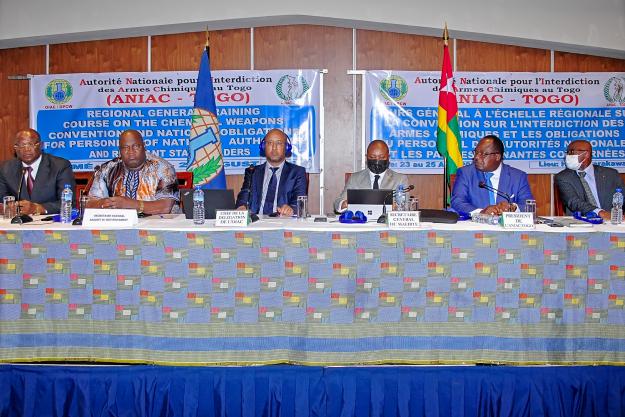
THE HAGUE, Netherlands—7 September 2022—The Organisation for the Prohibition of Chemical Weapons (OPCW) and the National Authority for Chemical Weapons Convention of Togo (ANIAC TOGO) co-organised a training course to support National Authorities of African Member States to implement the Chemical Weapons Convention (CWC) in Lomé, Togo from 23 to 25 August 2022.
The objectives of the course were to increase awareness in African Member States of their national obligations under the CWC and to strengthen their capacities to implement the Convention at a national level. Participants received lectures on crucial elements of the Convention including the national obligations of Member States, and the functions and responsibilities of National Authorities for effective national implementation of the CWC.

In his opening remarks, Mr Salifou Afoh, Secretary General of the Ministry of Foreign Affairs, Regional Integration, and Togolese Abroad stated: “The Lomé training is an opportunity for the OPCW States Parties in Africa to focus on understanding the fundamentals of the CWC and the mechanisms for implementing the Convention. The Convention is currently one of the most successful international instruments in the fight against chemical weapons including chemical terrorism. The importance of the training goes beyond the individuals in attendance as the training materials are freely provided to implement the training at national level and to reach a larger audience. I would like to reiterate my sincere gratitude to the OPCW and its partners for the human and financial resources deployed for the organisation of this course in Lomé.”
The President of the National Authority of Togo, Mr Hunlede Amah, remarked: “The training course is a part of an ongoing process aimed at engaging our respective National Authorities in Africa for the effective implementation of the Convention on the Prohibition of Chemical Weapons. I salute the partnership that the OPCW’s Technical Secretariat has forged with States Parties in the region through various capacity building activities. Support from the Secretariat enhances the awareness of officers and stakeholders who are not familiar with the CW, it also promotes networking and giving us more opportunities to foster knowledge sharing and learning amongst ourselves.”

The course was conducted under Article VII of the Chemical Weapons Convention, which mandates the Technical Secretariat to provide for international cooperation and assistance for States Parties to enact national implementing legislation.
The training was attended by 43 participants from 19 African OPCW Member States: Algeria, Botswana, Côte d’Ivoire, Democratic Republic of Congo, Ethiopia, Kenya, Liberia, Madagascar, Malawi, Mauritania, Morocco, Nigeria, Senegal, Sierra Leone, Sudan, Togo, Tunisia, Uganda, and Zambia.
Background
As the implementing body for the Chemical Weapons Convention, the OPCW, with its 193 Member States, oversees the global endeavour to permanently eliminate chemical weapons. Since the Convention’s entry into force in 1997, it is the most successful disarmament treaty eliminating an entire class of weapons of mass destruction.
Over 99% of all declared chemical weapon stockpiles have been destroyed under OPCW verification. For its extensive efforts in eliminating chemical weapons, the OPCW received the 2013 Nobel Peace Prize.
